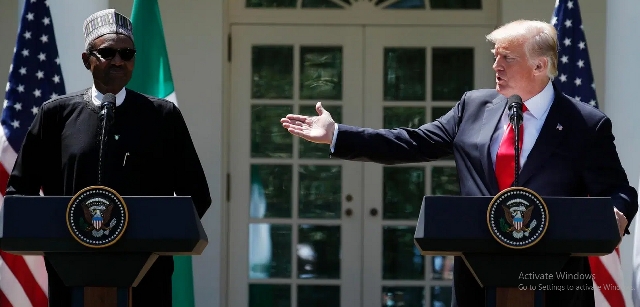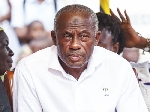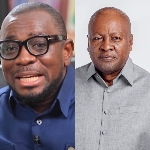Trump to impose travel, visa restrictions on Nigeria
 US President Donald Trump (R) and the President of Nigeria Mahammudu Buhari
US President Donald Trump (R) and the President of Nigeria Mahammudu Buhari
More African countries could soon be caught in the cross-hairs of US president Donald Trump’s immigration clampdown.
Three years after issuing a controversial travel ban initially slapped on seven Muslim-majority countries, the Trump administration is planning to expand the ban to reportedly include four more African countries: Nigeria, Sudan, Tanzania and Eritrea. The others are: Belarus, Myanmar and Kyrgyzstan.
While not disclosing the countries set to be affected, Trump confirmed the plans on the sidelines of World Economic Forum in Davos. An announcement of the additional countries could be made as early as Monday, Politico reports.
Given the legal challenges the initial travel ban faced following which a watered-down version was implemented, additional countries are unlikely to face a blanket ban on all citizens. Instead, possible restrictions may include travel bans issued to government officials or issuing shorter-term visas on citizens. However, an inclusion on the travel ban list will likely result in increased scrutiny for visa applicants from those countries.
Some of the African countries that could be affected already have some history with the Trump administration.
Nigeria, the most high-profile country under consideration, has particularly come under focus from the White House. With Nigeria accounting for the third-highest number of US visa overstays in 2018, the Trump administration has become tougher on Africa’s largest economy.
After indefinitely suspending its visa interview waiver for Nigerian applicants (the waiver allowed frequent travellers renew their visa without going through in-person interviews each time), the US also raised visa application fees for Nigerians by including additional “reciprocity fees” ranging from $80 to $303 depending on the class of visa. And even though the Nigerian government immediately slashed visa application fees for American applicants in a bid to get the US to reverse its price increase, the reciprocity fees remain in place. The clampdown measures have resulted in Nigeria recording the largest global drop-off in visitors to the US.
For its part, Sudan was one of the Muslim-majority countries initially named in the controversial Jan. 2017 travel ban. But, following legal challenges in US courts, Sudan was removed alongside Chad and Iraq. And, in Sept. 2017, Eritrea had all its nationals disallowed from applying tourist B visas for delays in accepting its citizens who had been ordered removed from the US.
Source: qz.com
Trending News

Karen Baaba Sam sues New Crusading Guide for defamation over child custody story
09:11
PMF demands dissolution of Interim Hajj Taskforce, calls for independent commission
11:56
Akim Swedru MP holds Mahama accountable for Ablekuma North electoral mess
15:37
GFZA CEO backs new pharmaceutical venture under Free Zones Scheme
15:35
Ghana, Australia deepen bilateral ties with focus on mining, green transition and education
06:45
A-G orders EOCO to investigate illegal mining allegations against two NDC national officers
03:49
Yamin, Abanga refute allegations of backing rogue anti-galamsey taskforce
11:15
CDS promotes soldier for rejecting bribe from illegal miners
15:28
Over 40,000 students reimbursed under gov't's ‘No Fees, No Stress’ initiative
13:06
OSP charges Mustapha Abdul-Hamid and 9 others for diverting GHS280 miliion
08:30



